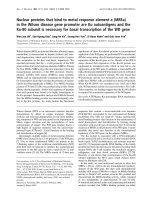the law in Britain material english for th law of united kingdom
Bạn đang xem bản rút gọn của tài liệu. Xem và tải ngay bản đầy đủ của tài liệu tại đây (1.29 MB, 12 trang )
TOPIC :
THE LAW IN BRITAIN
Contents
I. THE LAW IN BRITAIN
1. The police and the public
2. Crime and criminal procedure
3. The system of justice
4. The legal profession
II. THE LAW IN VIETNAM
1. The police and the public
2. Crime and criminal procedure
3. The system of justice
4. The legal profession
III. EXERCISE
I. THE LAW IN BRITAIN
1. The police and the public
- There was a time when a supposedly typical British policeman could be
found in every tourist brochure for Britian.
- The image of friendly Bristish ‘bobby’, with his fatherly manner, was
also well-known within the country and was reinforced by popular
television serials such as: Dixon of Dock Green
- Policeman’s strange-looking helmet and the fact that he did not carry a
gun made him a unique symbol for tourists.
He usually patrolled on foot or by bicycle. The local bobby was a familiar
figure on the streets, a reassuring presence that people felt they could trust
absolutely.
But in the 1960s the situation began to change in two ways :
- First, in response to an increasingly motorized society.Therefore
increasingly motorized crime, the police themselves started patrolling in
cars.
=> As a result, individual police officers became remote figures and
stopped being the familiar faces that they once were.
- Second, the police found themselves having to deal increasingly with
public demonstrations and with the activities of the youth.
Police officers were no longer known as ‘bobbies’ but became the ‘fuzz’ or
the ‘cops’ or the ‘pigs’.
- Since the middle years of the twentieth century, the police in Britain have
lost much of their positive image.
In the 1980s there were a large numbers of cases in which it was found
that police officers had lied and cheated in order to get people convicted of
crimes.
- Nevertheless, there is still a great deal of public sympathy for the police.
Because : +Police officers often still address members of the public as 'sir'
or 'madam'.
+Some police have even started to patrol on foot again.
+Police still do not carry guns in the course of normal duty.
2. Crime and criminal procedure
- There is a widespread feeling among the British public that crime is
increasing.
However, figures on this matter are notoriously difficult to evaluate
because not all actual crimes are necessarily reported.
- Official figures suggest that the crime of rape increased by more than
50% between 1988 and 1992.
=> In the last quarter of the twentieth century, the number of crimes with
firearms went up. And the fear of crime seems to have increased a lot.
This had gone together with a lack of confidence in the ability of the
police to catch criminals.
- There has also been some impatience with the rules of criminal
procedure under which the police and courts have to operate.
For example, unless they obtain special permission, they are not allowed
to detain a person for more than twenty-four hours without formally
charging that person with having committed a crime.
3. The system of system
- The system of justice in England and Wales, in both civil and criminal
cases, is (as it is in North America) an adversarial system.
+ Civil cases typically involve disputes between private parties.
It contains : defamation, assault, nuisance, negligence, false
imprisonment and trespass….
+ On the other hand, criminal cases involve actions that are considered
detrimental to society.
It contains : murder, rape, assault, theft, fraud, battery and burglary …
- There are basically two kinds of court: Magistrates Court and Crown
Court.
+ More than 90% of all cases are dealt with in magistrates'
court. Even serious criminal cases are first heard in a magistrate's court.
Magistrates only need to decide that there is a prima facie case against the
accused then refer the case to a higher court – Crown court.
+ Crown court, where a professional lawyer acts as the judge and the
decision regarding guilt or innocence is taken by a jury.
- The duty of the judge during a trial :
+ to act as the referee while the prosecution.
+ defence put their cases and question witnesses.
+ to decide what evidence is admissible and what is not.
+ to impose a punishment on those found guilty of crimes.
(A typical courtroom scene showing the judge, the jury, and a witness
being questioned by a barrister (cameras are not allowed in court) )
4. The legal profession
- There are two distinct kinds of lawyer in Britain : Solicitor and barrister
Solicitor
Barrister
A barrister in the gown and wig that must be worn in court
- The training of the two kinds of lawyer is very different :
+ All solicitors have to pass the Law Society exam.
+ Barristers have to attend one of the four Inns of Court in London.
- The different styles of training reflect the different worlds that the two
kinds of lawyer live in, and also the different skills that they develop:
+ Solicitors have to deal with the realities of the everyday world and its
problems.
+ Barristers, on the other hand, live a more rarefied existence.
II. THE LAW IN VIETNAM
1. The police and the public
- Vietnamese policeman usually patroll by motorbike and bring batons.
- They wear the uniform of police.
- Recently, Vietnam has new form of patrolling in Da Nang, Thanh Hoa –
by bicycle
The local police was a familiar figure on the streets.
2. Crime and criminal procedure
The crime is increasing rapidly, especially in big city such as Ha Noi ,
Hai Phong, Hue, Ho Chi Minh ….
According to Law Newspaper, the crime has the highest rate in Vietnam is
robbery. In June 2012, it about 51% in the total of crime.
3. The system of justice
- The system of justice in Vietnam consists of civil and criminal cases,
marriage and family, labour, economic …
- The Supreme People’s Court engages a wide scope of activities, such as
the organization and implementation of all stages of judicial work,
including hearing appeals, reviewing judgements, suppervising the
implementation of sentences:
+ The First court: Judments of first instance courts were legally effective
if not appealed within the time- limit for appeal.
+ The Appeal court: When one or more parties to the dispute appeals,
the Appeallate Body rewiews the findings in panel reports.
However, The trial panel was entitled to reject a protest, to remand, or
to set aside the judgments or decisions of the case.
4. The legal profession
- It also has two kinds of lawyer: the barrister and the solicitor.
+ The duty of solicitor: when the trial hasn’t been occurred, they gave
advice and information for his client.
+ The duty of barrister: they produce envidence in court to support his
statement and defend of his client.
III. EXERCISE
Answer the question.
1. What does the phrase “prima facie” means?
at first appearance or at first sight
2. What is the duty of the judge during a trial ?
+ to act as the referee while the prosecution
+ defence put their cases and question witnesses
+ to decide what evidence is admissible and what is not
+ to impose a punishment on those found guilty of crimes.
3. What is the different of training between solicitor and barrister ?
+ All solicitors have to pass the Law Society exam.
+ Barristers have to attend one of the four Inns of Court in London.
4. Give an example about the rules of criminal procedure in the lesson.
+ Unless they obtain special permission, they are not allowed to detain a
person for more than twenty-four hours without formally charging that
person with having committed a crime.









